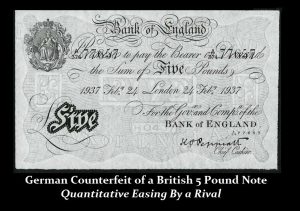Was the Labour Government the Cause of The British Pound Losing Reserve Currency Status?
QUESTION: Mr. Armstrong, I have a question: First you remarked that capital is terrified if Labour takes Parliament. I believe Labour won Parliament the first time in the twenties. Did that set off the sterling crisis of the thirties? It seems as though nobody really wanted to record the history of the Sovereign Debt Crisis of 1931. I think you are right. It would have undermined the rising socialism of the era. Was there a link between Labour and the fall of the pound as the reserve currency back then?
Thanks
WK
ANSWER: There is no question that if Jeremy Corbyn became Prime Minister, that would lead to the pound falling below par. In the aftermath of World War I, the US dollar’s growing dominance began to reduce sterling’s importance as a reserve currency. There was a massive run on sterling thanks to the win of the first Labour government taking office on January 22, 1924. They held it only between January 22 and November 4, 1924. The socialism which was engulfing Britain led to rising union strikes and militancy which really began in 1925 in the coal industry and then in 1926 a six-month coal strike began and a general strike which only accelerated unemployment. These events undermined the British Economy as there was no way the pound sterling would possibly remain as a reserve currency after Labor retook control between June 5, 1929 and June 7, 1935.
This is why capital is sacred to death if Labour took hold of Parliament under Corbyn for he is even more extreme than anyone ever was in Labour historically. The economic slide under the Labour government culminated in a massive run on sterling in 1931 and capital was pouring out to the United States. The Gold Standard broke down globally between 1930-1933 as Europe was clearly turning more socialistic at the time. The pound remained floating until 1939 and the outbreak of World War II.
World War II saw The Nazi strategy of forging British currency in an effort to undermine their effort to fund their defense. The Nazi government was counterfeiting British notes in massive quantities. By 1943 the Germans were producing 500,000 banknotes a month. Fake pound notes were causing major headaches for the Bank of England. To counter the fraud, the Bank introduced at that time a metal thread during the war to differentiate its issue from Germany’s, and they stopped producing higher denomination notes.


